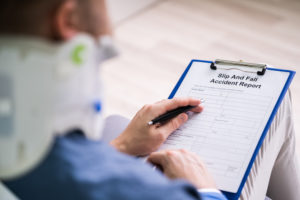What Are the Types of Spinal Injuries?
Injuries to the spine can occur in many different types of accidents, from car crashes to serious falls. The spinal cord is responsible for transferring messages from the brain to the body. Different types of spinal injuries can affect this messaging system in different ways. When the back or spine suffers an injury, the victim can experience a range of symptoms. These may include pain and stiffness or the loss of feeling and function below the point of injury.
Complete Spinal Injury
A complete spinal cord injury is one that results in the total loss of motor function and sensation. The victim will lose all sensory and motor function in the parts of the body below the injury. Complete spinal injuries can happen when trauma severs the spinal cord. If a bullet severs the spine in the middle of the back (the thoracic spine), for example, the victim might lose all feeling and the ability to function from the waist down. Extreme nerve and bone damage to the spine could also cause a complete injury. Complete spine injuries are often irreversible, although the patient may improve with surgeries and rehabilitative therapies.
For a Free Legal Consultation
Call The Personal Injury Lawyer Hotline.
804-250-5050
Incomplete Spinal Injury
An incomplete spinal injury can also interfere with the victim’s ability to feel and move below the point of impact. However, an incomplete injury will not totally disrupt these systems. Unlike a complete spine injury, the victim will retain some motor function and feeling below the point of impact, to a va
rying degree. The function and feeling retained will depend on the injury and the person. A victim may be able to recover from an incomplete injury, or else he or she might have a permanent partial disability.
Let the Heavy Hitters® Take On Your Case 804-250-5050
Paraplegia
Paraplegia is a type of complete spinal cord injury that removes function and feeling in the lower half of the body. Paraplegia could affect all or part of the trunk of the body, as well as the pelvic organs, legs and feet. Paraplegia can affect bowel and bladder control and sexual function. Injuries to the lower parts of the back – the thoracic, lumbar or sacral spinal cord – could cause paraplegia.
Central Virginia's Top Rated Personal
Injury Lawyers 804-250-5050
Quadriplegia
Quadriplegia is a more severe spinal injury than paraplegia. It describes the permanent loss of feeling and function from the neck or chest down. A patient with quadriplegia will have paralysis in all four limbs, as well as the trunk and pelvic organs. The patient may or may not be able to breathe on his or her own depending on how high up on the spine the injury occurred.
Let Us Be The Heavy Hitters® For Your Case Speak To An Attorney Now
Spinal Concussion
Spinal cord concussion is a more minor type of spinal cord injury that can cause temporary motor function weakness and sensory impairment. Spinal concussions are most common in sports-related impacts such as a football tackle or diving accident. Spinal concussions can happen due to disk herniation, ligament damage or compression of the spinal cord. The length of time it will take for the patient to heal can vary from case to case. Most symptoms go away within 24 to 72 hours.
Other Spinal Cord Injuries
A patient could experience other types of permanent paralysis depending on the nature of the injury. Brown-Sequard Syndrome, for example, causes paralysis or weakness in one side of the body but not the other. Triplegia affects both legs and only one arm. These types of spine injuries are less common than paraplegia and quadriplegia, however.
Spine Injury Treatments
The administration of steroids early after the spinal injury, along with spinal cord immobilization, could decrease the amount of swelling and damage to the spine. The patient may need surgery to strengthen the spine after a fracture or serious damage. From there, spine injury treatment focuses on rehabilitation. Physical and occupational therapies, along with mobility assistive devices, could help a patient regain some function and feeling, or at least improve quality of life.
If you’ve been seriously injured due to the negligence of another, contact our Richmond spinal cord injury lawyer today.
The Pendleton Law Team Is Here For You 804-250-5050



